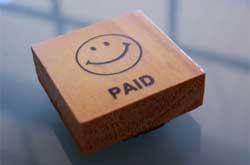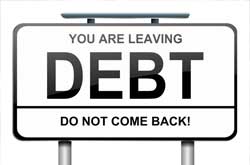
Best Strategies on How to Pay Off Your Debts
According to a recent survey conducted by Manulife Investor Sentiment Index, Filipinos rank high in Asia when it comes to short-term savings and expense tracking. However, Filipinos rank second when it comes to personal debts, with more than 80% of respondents having a high amount of debts.
Before you start stressing about your own debts, you should know that there are good debts and bad debts. Money that you borrow to invest, to purchase your home, to set up a business, to send your children to school is considered a good debt. Debts that pile up from your credit cards and personal loans when you buy goods and pay for services are considered bad debts.
If you can be completely debt-free, that will be even better! However, with the cost of living in the Philippines and many unforeseen circumstances, you will incur debts eventually. If you’re not careful or responsible enough, your debts will accumulate and you will have a tough time paying them off.
Paying off your debts takes a lot of hard work and determination. It can take years, even decades. But if you’re really committed to paying them off, there are steps you can take to settle them sooner rather than later.
 Settle The Biggest or Most Expensive Debts First
Settle The Biggest or Most Expensive Debts First
When it comes to credit card debts, settle the ones with the highest interest rates first. Prioritize paying off your credit card balance that has the highest interest while also making regular minimum payments each month with your other cards. If budget permits, pay more than the minimum monthly amount, or make weekly payments instead of just once a month.
 Transfer Your Credit Card Balance
Transfer Your Credit Card Balance
If your credit card has a high interest, you can opt to transfer your debt to a credit card that offers lower interest when you avail of their balance transfer feature. Just make sure that you will be able to pay off the balance transferred. Otherwise, you will be hit with higher interest rates and finance charges. Shop around and find a credit card that offers the lowest interest rate with the longest duration.
 Lie Low on Your Credit Card Spending
Lie Low on Your Credit Card Spending
Your credit card can be very useful, especially when it comes to cash emergencies. However, if you’re really serious about paying off your debts, you will refrain from using your credit card for small and unnecessary purchases until you have your finances under control. You will not swipe your credit card again until you have settled your most urgent financial obligations.
If you have several active credit cards, now is a good time to cancel the ones that you don’t really need. The more credit cards you own, the more you will be tempted to spend. Keep one credit card so that it’s easier for you to track and control your spending. Just go ahead and cancel the rest.
 Extra Money Should Go Immediately to Settling Your Debts
Extra Money Should Go Immediately to Settling Your Debts
It’s very hard to part with money that you receive as bonuses, winnings, or extra income just to pay off your debts. But if you will not prioritize paying off your credit card, personal loan, or home loan, you are only prolonging your agony and delaying your financial freedom.
The sooner you pay off your debts, the sooner you can take charge of your financial future. You need to make sacrifices for a while so that you can truly enjoy the money that you earn and finally stop worrying about money matters.
Having multiple credit cards will eventually take it’s toll especially when it comes to paying your annual fee at the end of the year. You can go with credit cards that have no annual fee for life and save that extra money to help settle your debts.

Metrobank M Free / Lite MasterCard
Free annual membership fee for life
No need to worry about the year-end annual fee, it's free! Stop Creating New Debts
Stop Creating New Debts
Be responsible with your spending habits. Look at the small ways you’re spending your money each day. Do you really need to charge your daily morning latte and your expensive lunch sandwich to your credit card? Did you know that you spend more when you pay with your credit card, compared to when you pay with cash? Studies conducted by the Sloan School of Management at the Massachusetts Institute of Technology in the US show that people are willing to spend up to 100% more when they use their credit cards.
If you walk into a restaurant with just ₱500 in cash to spend, you’ll make sure to order a dish that costs less than ₱500. But if you’ll be paying with your credit card, you can go over ₱500 and not even mind going over your budget. Always pay with cash. Leave your credit card at home to avoid temptation, and reserve your credit card purchases only for emergencies.
 Make Extra Money on the Side
Make Extra Money on the Side
Every month, your income will automatically go to pay your bills and buy the basic necessities. Whatever’s left will go to your personal needs. If money is tight, where will you get the money to pay off your debts?
You can earn it by creating extra streams of income. You can explore freelancing work both online and offline, or you can open your own online store and sell all sorts of goodies. If you want to make money from some of the stuff that you own, you can create an online store on Facebook or Instagram and sell your pre-loved items there. You can do this until you are able to pay off your debts from your credit cards and HSBC personal loan. You can even do this long-term if it’s really turning out to be a lucrative business!
 Stick to a Bare-bones Budget for a While
Stick to a Bare-bones Budget for a While
You can also cut down on your expenses and use the money that you save to pay off debts. Try to live on as little budget as possible without sacrificing your health and security. See how long you can survive with this new budget. Remove unnecessary spending, like eating out, watching movies, or shopping. Remember that this is only temporary. You can adapt this kind of lifestyle until you have managed to pay off a significant amount from your debts. Once you’re close to your goal of being debt-free, you can gradually go back to your regular spending. Only this time, you have to be more mindful and more responsible so that you will not incur the same amount of debt again.
Learn from Sha Nacino’s first hand experience with iMoney’s exclusive interview, as she discusses how she went from being debt-ridden to becoming a successful personal finance adviser.




Leave your comment